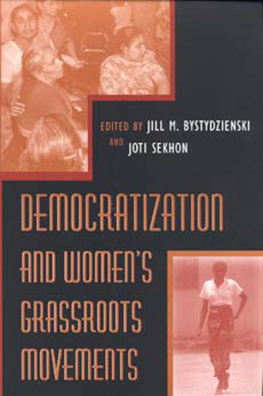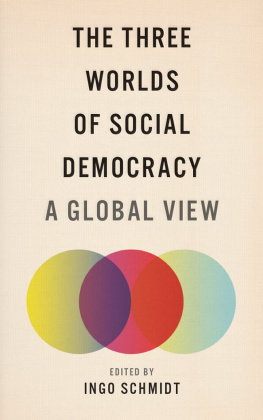First published 1997 by Routledge
Published 2016 by Routledge
2 Park Square, Milton Park, Abingdon, Oxon OX14 4RN
711 Third Avenue, New York, NY 10017, USA
Routledge is an imprint of the Taylor & Francis Group, an informa business
Copyright 1997 by Routledge, Inc.
All rights reserved. No part of this book may be reprinted or reproduced or utilised in any form or by any electronic, mechanical, or other means, now known or hereafter invented, including photocopying and recording, or in any information storage or retrieval system, without permission in writing from the publishers.
Notices
Practitioners and researchers must always rely on their own experience and knowledge in evaluating and using any information, methods, compounds, or experiments described herein. In using such information or methods they should be mindful of their own safety and the safety of others, including parties for whom they have a professional responsibility.
Product or corporate names may be trademarks or registered trademarks, and are used only for identification and explanation without intent to infringe.
Kaplan, Temma, 1942
Crazy for democracy: women in grassroots movements/Temma Kaplan.
p. cm.
Includes bibliographical references.
ISBN-13: 978-0-415-91662-2 (hbk)
ISBN-13: 978-0-415-91663-9 (pbk)
1. Women social reformersUnited States. 2. Women social reformersSouth Africa. 3. Social movementsUnited States. 4. Social movementsSouth Africa. I. Title.
HN49.W6K36 1996
303.484dc20
96-18574
CIP
MODERN TIMES ARE ALL PERIODS of upheaval when you are living through them. But from the perspective of an historian, the decades from the sixties through the mid-nineties may have been the most profound period of transformation women have ever experienced. When I directed a womens research center in the eighties and early nineties, people from the media frequently called to confirm what they already believed: that the womens movement was white and middle-class. When I said the opposite, that I think feminisms greatest impact can be seen in the way poor and working-class women of all colors have been linking womens rights and human rights, the press quickly hung up. So I decided to write this book.
The women discussed here dont frequently appear on television or in the papers; they are not stars. But they are very well known to tens of thousands of people whose lives theyve helped to transform. Because theyve welcomed me into their homes and movements and given me formal interviews but have also taken me into backwoods cabins, neighborhoods scorched by toxic waste, and squatter communities where theyve lived, sharing family anxieties and teaching me about what political life can be like when democracy concerns itself with human need, they have been my teachers and mentors. My special thanks go to Dollie and Kim Burwell, Josette Cole, Lois Gibbs, Luella Kenny, and Regina Ntongana.
My friends who are also my family have shaped me and this book. Bennett Sims, whose sense of humor eases any situation, shares my curiosity and keeps me from hiding in a scholarly shroud. The best of all companions, he can walk any walk and talk any talk. T. J. and Lois Anderson weave together communities of politically committed artists wherever they go and have included me in these groups. With the style and wit of which only they are capable, Mary Gordon and Victoria de Grazia have inspired me to reach beyond old limitations. From Amy Ansara, Dolores Hayden, Nancy Hewitt, Luella Kenny, Claudia Koonz, Addie and Murray Levine, and Kathryn Kish Sklar, I have learned to think about politics over long distances.
Marianne Hirsch told me I was a storyteller and thereby gave me a voice. Ellen Ross and Dick Glendon, with Maud and Hope in tow, have always come through for me, giving valuable advice that has ranged from historical and medical practice to the use of sequins or the care of guinea pigs. Sheila Rowbotham, Dorothy Thompson, Radha Kumar, Naomi Rosenthal, Deborah Rhode, Deborah Silverman, and Judy Walkowitz serve in different ways as examples of what political commitment can do for the creation of engaged historical writing. Leo Spitzer, who brings people and continents together, has taught me to reveal the autobiographical dimensions of my political passions. Christine Stansell is as thoughtful and subtle a gardener as she is an historian, and has nurtured me both horticulturally and historically.
Karin Shapiro, Jacklyn Cock, Josette Cole, Michael Godsby, Sandra Klopfer, Sheila Meintjes, Regina Ntongana, Deborah Posel, and Laurine Platzky introduced me to the history and politics of South Africa and have stood by me even when they have disagreed with me. Barbara Weinstein, Helen Cooper, Lou Charnon Deutsch, and Adrienne Munich, through their own courage and intelligence, have set a high standard that I hope I can meet. Mary Yeagers commitment, energy, and generosity have seen me through good times and bad.
I don t know where Id be without the shrewd advice and unconditional support of Deborah Valenze and Robert Moeller, who give the word scholarship new cachet. Both share themselves as well as their intellects, always helping to shape what I want to say, frequently realizing what Im getting at more quickly than I do. Of course, neither is responsible for my excesses.
The American Association of University Women, American Council of Learned Societies, National Endowment for the Humanities, National Humanities Center, and Research Foundation of the State University of New York at Stony Brook have generously provided me with the resources to carry out the research for this book and time to write it. There is no way to thank them enough. I am especially grateful to Robert Conner and Kent Mullikin, who make the National Humanities Center the humane and nurturing place it is. Many new insights emerged there in seminars and conversations with Kate Bartlett, Susan Porter Benson, Steve Caton, Marianne Hirsch, Gil Joseph, Michael Maas, Ed Muir, Leo Spitzer, and Alex Zwerdling.
The most remarkable journey Ive made in the course of this study has been my foray into the world of the third wave. Plenty has been said about Generation X that totally overlooks the work of young African-American, Asian, Latina, Native American, and white women born to lead through participation. In both the United States and South Africa, their movements combine the entitlement of feminism with those of cultural politics, bringing together a no-nonsense view of the world and rap, hip-hop, and township jazz. Whereas we in the first generation of second-wave feminism need one anothers almost daily reassurance that we can and must cross the boundaries, the third wave will crest into the promised land. Thank you Abby, Abra, Angie, Anna, Bodi, Emma, Julie, Kim, Marva, Meg, Mia, Polly, Rosa, Olie, Shannon, Tanya, and, most of all, Laurie Liss, who always believed in this book, and Cecelia Cancellaro, Christine Cipriani, and Jeanne Park, who made it happen.
The first debt of gratitude is also the last. When I was lucky enough to spend a year in North Carolina, I kept coming across references to Warren County, North Carolina, and to the role that struggles there played in alerting people to the relationship between toxic waste and race. The name that came up repeatedly in connection with the movement was Dollie Burwell, and I set out to find her. When I finally did, her commitment, faith, courage, intelligence, and strength made me understand the world in a whole new way. After she heard me speak in public about her, her daughters, and the other grassroots women leaders discussed here, I nervously awaited her verdict. She told me, because of her interest in the other women and their movements, now you really must finish the book. So, for Dollie.








